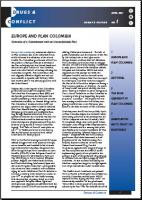Ideas into movement
Boost TNI's work
50 years. Hundreds of social struggles. Countless ideas turned into movement.
Support us as we celebrate our 50th anniversary in 2024.

The first issue of the Drugs & Conflict Debate Papers is devoted to the controversies that have arisen around Plan Colombia.

This briefing paper is the first in series TNI will produce on 'Drugs & Conflict.' Our intention is to stimulate public and policy debates on the connections between drugs and conflict. The illegal drugs economy, as well as the current global anti-drugs policies, are important factors, which increase social tensions, fuel armed conflicts, aggravate related problems such as human rights violations, forced displacement and environmental degradation as well as obstructing and undermining the search for peaceful solutions. The intention of this briefing series is to encourage support for alternative drug policies based on principles consistent with a commitment to harm reduction, sustainable development, democracy, human rights, and conflict prevention.
This first issue is devoted to the controversies that have arisen around Plan Colombia. It is released at this particular moment to inform discussions on supporting the peace process in Colombia around the third round of the international donor conference in Brussels. The first and second rounds having taken place in Madrid last July and Bogotá last October, it is at this third round on April 30th in Brussels that the international community will clarify how the funds will be put to the most effective use in the promotion of a peaceful resolution in the Colombian armed conflict. When the US decided to create a predominantly military aid package to intensify anti-drugs operations, the eyes of the world turned to focus on Europe. During the past year, intensive diplomacy and internal debates took place within the European Union in the struggle to define its position. That process, which was often confusing, is reconstructed in the first of the three texts in this issue of Drugs & Conflict. It became clear that Europe has been reluctant to play the role of the development 'carrot' alongside the US-financed military 'stick,' which to many EU member states is an incompatible strategy. The central question now is whether Europe will manage to develop a strategy more in concert with the Colombian civil society and local authorities whose outright and unanimous rejection of the Plan is because the peace process has been systematically undermined precisely due to this anti-drug approach. The second article analyses how and why Plan Colombia became so thoroughly delegitimised.
Pages: 8